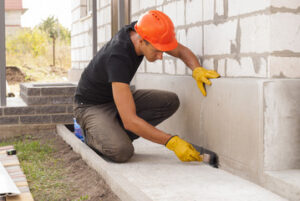Water is essential for many aspects of daily life, but when it gets where it’s not supposed to be, it can cause major damage. Immediate action and professional restoration can prevent structural damage, minimize cost, and save belongings.

Every moment of delay compounds the damage, increasing the restoration costs exponentially. The first step is shutting off the main water supply valve. Next comes cleaning and sanitizing. Contact Water Damage Repair Utah for professional help.
Water is essential for life – it contributes to healthy living, cooking, weather regulation and more. However, when too much of it goes where it shouldn’t be, disaster can strike. Water damage is costly, and restoration can be challenging. Knowing how to prevent it can save you money, time and hassle.
One of the most important things to keep in mind is that the longer water remains on a property, the more damage it will do. This is why it’s imperative that you act quickly to limit the effects of water damage.
If possible, shut off the source of the water to minimize the amount of water damage caused. Also, take precautions to stop water from entering inappropriate areas such as boarding up damaged windows and covering walls with plastic sheeting.
It’s also important to remove all items in the affected area that aren’t salvageable. This includes furniture, rugs and any other materials that are soaked with water. This helps speed up the drying process and makes it less likely that mold or mildew will grow.
Mold and mildew aren’t just unsightly – they can also be dangerous for your health. They thrive in damp, dark environments and can lead to symptoms such as sneezing, itchy eyes and respiratory issues. In severe cases, some types of mold can even cause headaches and memory loss.
Water damage repair professionals are trained to identify and address potential hazards in the affected area. This can include electrical dangers and structural damage. They may also use special equipment to test for water levels in hard-to-reach places, like inside walls or under floors.
Preventing water damage is not always possible, but you can protect your home against it by performing regular visual inspections and fixing small leaks promptly. In addition, installing backflow prevention devices can help keep contaminated water out of your house during heavy rainfall or sewer backups. You should also regularly review your homeowners’ insurance policy and consider additional coverage if necessary. Keeping thorough records and documentation of all expenses related to water damage will also help expedite insurance claims.
Extraction
In addition to addressing immediate safety concerns, the first step in water damage repair involves eliminating excess water. This may involve shutting off valves, redirecting water flow, or pumping out flooded areas. The goal is to keep water from seeping into inappropriate spaces, which could lead to further damage and mold growth.
The next step in preventing further damage is to remove ruined material from the damaged area. This can include removing carpeting, padding, and drywall as well as cleaning and disinfecting the affected areas. The professional restoration team will use special tools to dry and disinfect these materials, which is critical for protecting the structure and preventing mold.
Once all of the unsalvageable materials are removed, the focus shifts to drying and dehumidifying the affected space. The professionals will use industrial-grade air movers and dehumidifiers to accelerate the drying process, which is essential for avoiding mold growth and other long-term problems.
After the space is dry, the restoration team will inspect the area to ensure that no further damage has occurred. This inspection also helps the team determine the best way to repair and restore the affected space. For example, if drywall has been saturated with clean water, it may be possible to salvage and restore the material. However, if the drywall has been exposed to contaminated gray or black water, full replacement may be necessary.
It is important to note that there are many things that can go wrong during the water damage repair process, so it’s best to leave this type of work to professionals who have the experience and tools to handle it correctly. Water damage can be devastating, and if not addressed quickly and properly, it can result in extensive long-term damage to your property. By following these water damage tips, you can help minimize the damage and reduce your restoration costs. The more you understand about the process of restoring your property to pre-loss condition, the easier it will be for you to find a company that can provide the services that you need.
Drying
The drying process is a key step in water damage restoration, as it allows materials to return to their original state. This helps prevent permanent structural damage, mold growth, and other complications caused by moisture. To speed up the drying process, it is important to make sure the affected area is well ventilated and has enough airflow. This can be done by opening windows and using fans to circulate the air. It is also helpful to remove as much furniture and other items from the affected area as possible.
Once the excess water is removed from the building, the area needs to be dried out as quickly as possible. This can be done through a variety of methods, depending on the extent of the water damage and what materials are involved. For example, porous materials such as drywall and carpet will hold onto moisture longer than non-porous materials like tile and concrete. Additionally, the size of the affected area will play a role in how long it takes for the space to dry out.
For smaller areas, mops and wet/dry vacuums can be used to quickly remove the water. For larger areas, pumps and dehumidifiers may be necessary. For contaminated materials, sanitization treatments can be used to kill bacteria and other contaminants.
It is also important to note that the drying process can take up to a month for severe cases of water damage. This is because the water can spread deep into the materials and affect them more significantly than expected. The good news is that reacting quickly to water damage can help prevent this from happening and reduce the amount of time that it takes for a home or business to be fully repaired after a flood or burst pipe.
It is also important to note that even with the best efforts, some items may not be salvageable after water damage. This is because the items will be weakened by the moisture and will eventually need to be replaced. This is particularly true for category 3 water damage, which often includes sewage and other contaminants. For this reason, it is recommended to hire professional water damage restoration services after a flooding event.
Documentation
Documenting residential water damage is an essential step in the insurance claim process and the professional restoration work that follows. Thorough documentation will help homeowners and property managers ensure they are able to receive the full compensation they deserve. Start by taking clear, well-lit photographs of the affected areas and items. Capture wide shots of the area and close-ups of specific items and structures, noting their original value and condition before damage. It’s also important to note the water source, if possible.
Once the damaged areas have been documented, turn off the water supply valves to prevent further flooding and deterioration. This is especially important for preventing mold and other serious health hazards. Next, remove and dry any valuable items that have been affected by the water damage. This includes electronics, personal belongings, furniture, and sentimental objects. Finally, take a look around the property and note any structural issues such as sagging walls or ceilings.
Lastly, contact your insurance company to report the damage and to receive instructions and requirements for your claim. Then, hire a restoration contractor to dry, sanitize, and restore the affected spaces. Ensure you choose a licensed, reputable, and certified restoration contractor, as recommended by your insurance company or by other trusted sources.
Water damage repair can be a long and costly process, so it’s important to document everything thoroughly to ensure that you get the compensation you need. By following the tips above, you can minimize damage, make the restoration process run more smoothly, and save money in the long run.
Whether due to a burst pipe, natural disaster, or overflowing appliance, water damage can be a stressful experience for homeowners and renters. However, by minimizing damage and acting swiftly, you can avoid costly repairs and minimize the impact on your home or business.





